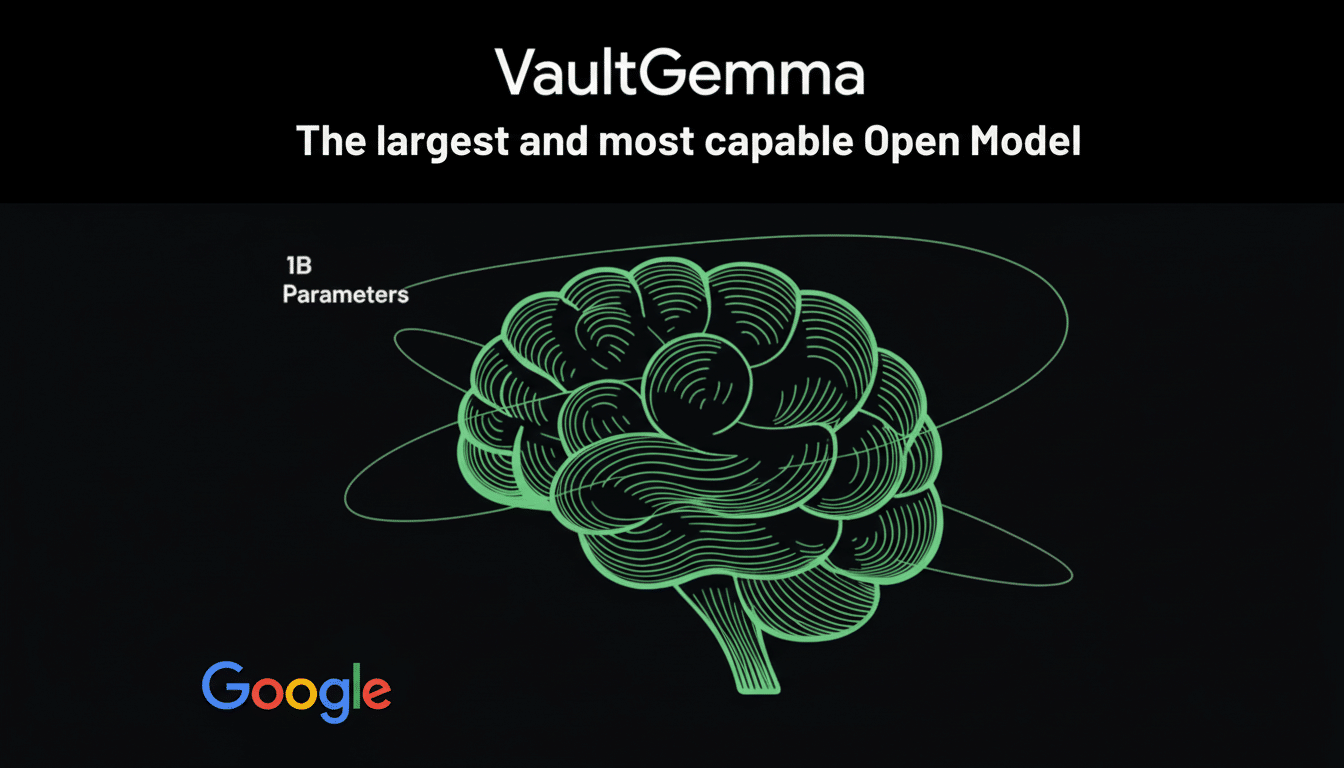Google’s newest research effort, VaultGemma, is a direct assault on one of AI’s thorniest trade-offs: how to safeguard users’ privacy without hobbling model quality. Based on the Gemma 2 family of models and trained with sequence-level differential privacy, the model is engineered to provide fluent answers while dramatically reducing the chances of spouting out too much sensitive training data. The result is a large but privacy-first language model that hopes to keep utility alive without feeling like you’ve fallen off a performance cliff.
The issue is well-known to anyone working in LLMs. Give a model more data and it generally sounds smarter—but in the new research, it can also memorize, occasionally regurgitating names, emails, or even entire paragraphs it had seen while training. In fact, academic work by researchers from Google, UC Berkeley, and others has already demonstrated that extraction attacks can extract verbatim training snippets from popular models. That’s a compliance nightmare in industries under GDPR and the CCPA, and is a reputational risk for anyone deploying generative AI en masse.

How differential privacy is baked into VaultGemma
Differential privacy (DP) during training—in the form of noise added to gradients—is adopted by VaultGemma; in other words, the model is not allowed to precisely memorize its inputs. DP is a mathematical formalism: it bounds how much any single item in the training data can have an effect on the model parameters, so that outputs don’t change statistically significantly regardless of whether a given record was included or not. That’s good in practice: it means the model can learn broad strokes without getting bogged down by details that might uniquely identify individuals.
What Google is doing here is moving from a position of token-level guarantees to sequence-level guarantees. Rather than treating privacy as a per-token constraint, VaultGemma tries not to end up memorizing whole sequences (like an entire sentence, chat transcript, or code snippet) in some way that could be faithfully and reliably reproduced. The higher level of protection it offers to users is important because leaks tend to come in the form of long, rare strings, not individual words.
Why sequence-level privacy guarantees truly matter
Example 1: If we are dealing with a log of customer support that has an address or a symptom mentioned just once in the corpus. Conventional training would just memorize that rare sequence quietly and be vulnerable to regurgitating it when given the proper prompt. Sequence-level DP directly addresses this “long-tail leak” issue: as long as there’s a single unique fact in the training data, none of its outputs would be distinguishable from ones produced by a model that never saw it.
That design is consistent with recommendations from organizations such as NIST that encourage reducing the chance of data leakage in AI systems and reflects concerns raised by privacy regulators about membership inference attacks and model inversion attacks. It is also beneficial for teams bound to operate under “right to be forgotten” constraints, since the need for brittle post-hoc removal mechanisms used alongside DP declines.
Performance results: surprising figures and findings
VaultGemma is on the small side—“only” about 1 billion parameters—but it does pretty well, even coming within striking distance of prior non-private baselines on standard language benchmarks like the GPT-2–class models. It’s not state-of-the-art, but as a statement, it nevertheless serves as a powerful reminder that rigorous privacy doesn’t have to erase utility. Google’s researchers frame it as closing the compute–privacy–utility gap: privately trained models today can achieve the same quality as non-private models from a few years ago, and we as a community can push that frontier further.

The team describes how practical training techniques—careful noise calibration, clipping strategies, and curriculum choices—are used to reduce the typical costs of DP so the model learns generalizable patterns without overfitting. It’s a relatively modest but crucial move away from the long-held belief that strong privacy necessarily leads to slow performance.
What this means for developers and organizations
For builders, the headline is straightforward: you can iterate on actual customer data with stronger safety rails. Think contact-center transcripts, financial communications, or internal documentation—data you want a model to learn from but never repeat. When used in conjunction with retrieval-augmented generation, on-device inference, and other features to preserve privacy, sequence-level DP is one layer in a defense-suffused, multilayered security effort that complements existing privacy engineering work spanning from access controls through redaction pipelines.
The release also encompasses a larger industry trend toward privacy-preserving AI, seen in efforts like federated learning and secure enclaves. Apple’s Private Cloud Compute, for instance, is focused on minimizing data at inference time; VaultGemma pushes the needle during training, where most high leakage risk originates. These approaches, taken together, indicate that privacy-by-design is a better approach to SPC than privacy-by-patch.
Open model weights and fully reproducible methods
Google released the model weights and training code for VaultGemma, distributing it via community hubs like Hugging Face and Kaggle. That openness matters: independent researchers can test what the privacy guarantees mean in practice, try out extraction attacks, and quantify trade-offs based on standardized evaluations. How robust the approach is will be decided by external scrutiny, not marketing claims.
Look for the next wave of work to evaluate how sequence-level DP scales to larger models, how it interacts with reinforcement learning from human feedback, and how to set privacy budgets that balance safety and accuracy in separate domains. For fair comparisons between labs, transparent reporting of privacy parameters, training compute, and benchmark suites will be essential.
The takeaway: VaultGemma doesn’t settle the privacy–performance argument, but it places that debate in a new context with hard data. By baking privacy into the core learning process and proving that quality can be viable, Google’s researchers provide a pragmatic template for the industry: look after people, uphold utility, and treat user privacy as a first-class metric alongside accuracy and latency.

